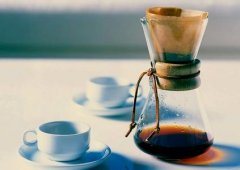Basic knowledge of fine coffee what is caffeine alcohol?
Caffeine alcohol is a diterpene compound in coffee. Caffeine is high in unfiltered coffee, such as Turkish coffee, but it is so low in filtered coffee that it is almost negligible.
In the 1980s, it was found that consumption of unfiltered coffee could raise serum cholesterol levels, and this result was caused by caffeinol and caffeinol in coffee.
Caffeine and caffeinol can be separated from coffee beans in oil, which are fat-soluble substances of diterpenes. The only difference between them is that coffee bean alcohol has an extra double bond.


The concentrations of these two substances vary from coffee to coffee. Arabica coffee beans contain caffeol and caffeinol, while Robusta coffee beans contain half caffeine and almost no caffeinol. These two substances account for 1% of the total amount of Arabica coffee beans.
Caffeine is more effective than caffeinol in raising serum cholesterol, and the mixture of caffeine (60 mg / day) and caffeinol (51 mg / day) is only slightly higher than pure caffeine (64 mg / day). Because coffee bean alcohol is difficult to purify and the stability of this diterpene is not good, the effect of pure coffee bean alcohol on improving serum cholesterol is unknown.
Both substances can be extracted by hot water but remain on the filter paper. This explains why Nordic boiled coffee, Turkish coffee and French compressed coffee contain relatively high levels of caffeol and caffeinol (6-12 mg / cup), while filtered coffee and instant coffee contain small amounts of caffeol and caffeinol (0.2-0.6 mg / cup). Although the content of diterpene is relatively high in espresso brewed under steam pressure, it is only a secondary source of caffeol and caffeinol (4 mg / cup) because of its low consumption.
Important Notice :
前街咖啡 FrontStreet Coffee has moved to new addredd:
FrontStreet Coffee Address: 315,Donghua East Road,GuangZhou
Tel:020 38364473
- Prev

Chemex American bubble pot coffee pot makes good coffee
The American follicle pot is a coffee pot invented in the United States by Dr. Peter J.Schlumbohm, who was born in Germany in 1941. Its design and particularity are recognized, not only selected as one of the top 100 Illinois Institute of Technology modern products, but also displayed by MoMa in New York as a permanent collection of Smithsonian and the Philadelphia Museum of Art.
- Next

Coffee etiquette in the workplace the etiquette of drinking coffee
1. Authentic black coffee does not contain sugar, but you can add sugar or milk according to your own taste or habit. 2. Use a small spoon when drinking coffee. It is worth noting that that small spoon has only one function, that is, to stir coffee. So never use it to scoop coffee. When drinking coffee, take out the spoon.
Related
- Beginners will see the "Coffee pull flower" guide!
- What is the difference between ice blog purified milk and ordinary milk coffee?
- Why is the Philippines the largest producer of crops in Liberia?
- For coffee extraction, should the fine powder be retained?
- How does extracted espresso fill pressed powder? How much strength does it take to press the powder?
- How to make jasmine cold extract coffee? Is the jasmine + latte good?
- Will this little toy really make the coffee taste better? How does Lily Drip affect coffee extraction?
- Will the action of slapping the filter cup also affect coffee extraction?
- What's the difference between powder-to-water ratio and powder-to-liquid ratio?
- What is the Ethiopian local species? What does it have to do with Heirloom native species?

